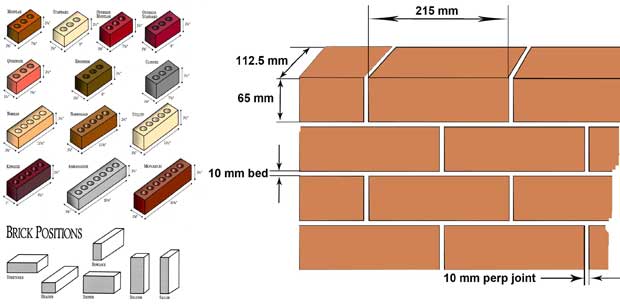
Various countries have various standard brick size and dimensions, however, brick can be made in multiple shapes and sizes, depending on its application. If bricks are large, it is difficult to burn them properly and they become too heavy to be placed with a single hand. On the other hand, if bricks are small, more quantity of mortar is required. Hence, a standard dimension is determined for various brick works. Actual size (or the specified size), is the real dimension of the brick. Nominal size is the actual size plus the width of the mortar joint. Most bricks are manufactured in such a way that the nominal sizes fit into a grid of 4 inch, which comply with the modules of other building materials such as doors, windows, and wood components.
Contents:
- Brick Size in England
- Brick Size in USA
- Brick Size in Australia
- Brick Size in India
- Brick Size in Nepal
- Face Brick Dimensions
Standard Brick Size in England
“In England, the length and width of the common brick has remained fairly constant over the centuries but the depth has varied from about two inches (about 51 mm) or smaller in earlier times to about two and a half inches (about 64 mm) more recently. In the United Kingdom, the usual size of a modern brick is 215 × 102.5 × 65 mm (about 8 5⁄8 × 4 1⁄8 × 2 5⁄8 inches), which, with a nominal 10 mm (3⁄8 inch) mortar joint, forms a unit size of 225 × 112.5 × 75 mm (9 × 4 1⁄2 × 3 inches), for a ratio of 6:3:2.” – Wikipedia
Standard Brick Size in United States
“In the United States, modern standard bricks are (controlled by American Society for Testing and Materials i.e. ASTM) about 8 × 3 5⁄8 × 2 1⁄4 inches (203 × 92 × 57 mm). The more commonly used is the modular brick 7 5⁄8 × 3 5⁄8 × 2 1⁄4 inches (194 × 92 × 57 mm). This modular brick of 7 5⁄8 with a 3⁄8 mortar joint eases the calculation of the number of bricks in a given run.” – Wikipedia
Standard Brick Size in Australia
According to Boral Company in Australia, the standard brick size (or the working size) is 76mm high, 230mm long and 110mm wide as per the Australian Standard AS4455. Some bricks are made with different work sizes. 50 mm and 90 mm high bricks, 90 mm wide bricks and 290 mm long bricks are used for different structural and aesthetic effect. Larger bricks are often used for more economical laying and as a design feature either on their own or combined with smaller bricks.
In cyclonic areas larger (140 mm wide x 90 mm high x 290 mm long) hollow bricks are used to allow reinforcement and grouting in the wall. Wider (150 mm wide) bricks can also be used in walls requiring lower sound transmission, higher fire resistance levels and higher load bearing capacity depending on the specific brick properties.
Standard & Nominal Brick size in India
In India, standard brick size is 190 mm x 90 mm x 90 mm as per the recommendation of BIS. With mortar thickness, the dimension of the brick becomes 200 mm x 100 mm x 100 mm which is also known as the nominal size of the modular brick.
Standard Brick Size in Nepal
According to National Building Code (NBC 205 : 1994) of Nepal, the bricks shall be of a standard rectangular shape, burnt red, hand-formed or machine-made, and of crushing strength not less than 3.5 N/mm². The higher the density and the strength, the better they will be. The standard brick size of 240 x 115 x 57 mm with 10 mm thick horizontal and vertical mortar joints is preferable. Tolerances of -10 mm on length, -5 mm on width and ±3 mm on thickness shall be acceptable for the purpose of thick walls in this Mandatory Rules of Thumb (MRT).
Note: The main objective of these Mandatory Rules of Thumb (MRT) in National Building Code of Nepal are to provide ready-to-use dimensions and details for various structural and non-structural elements for up to three-storey reinforced concrete (RC), framed, ordinary residential buildings commonly being built by owner-builders in Nepal.
Face brick dimensions:
Face bricks are the bricks used on exterior surfaces of a structure or houses. In the table below, we have given the standard dimensions of face brick on various countries listed in alphabetical order (both in imperial and metric unit).
| Face brick (“house brick”) dimensions: | ||
| Standard | Imperial (in) | Metric (mm) |
| Australia | 9 × 4⅓ × 3 | 230 × 110 × 76 |
| Denmark | 9 × 4¼ × 2¼ | 228 × 108 × 54 |
| Germany | 9 × 4¼ × 2¾ | 240 × 115 × 71 |
| India | 9 × 4¼ × 2¾ | 228 × 107 × 69 |
| Romania | 9 × 4¼ × 2½ | 240 × 115 × 63 |
| Russia | 10 × 4¾ × 2½ | 250 × 120 × 65 |
| South Africa | 8¾ × 4 × 3 | 222 × 106 × 73 |
| Sweden | 10 × 4¾ × 2½ | 250 × 120 × 62 |
| United Kingdom | 8½ × 4 × 2½ | 215 × 102.5 × 65 |
| United States | 7⅝ × 3⅝ × 2¼ | 194 × 92 × 57 |
